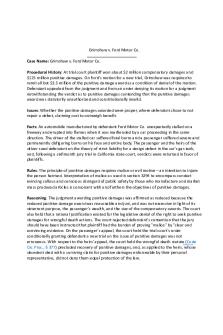Grimshaw v Ford Motor Co Case Brief PDF

| Title | Grimshaw v Ford Motor Co Case Brief |
|---|---|
| Author | Laura Navia |
| Course | Elements |
| Institution | University of Miami |
| Pages | 2 |
| File Size | 54.1 KB |
| File Type | |
| Total Downloads | 31 |
| Total Views | 162 |
Summary
Case Brief...
Description
Grimshaw v. Ford Motor Co. Case Name: Grimshaw v. Ford Motor Co. Procedural History: At trial court plaintiff won about $2 million compensatory damages and $125 million punitive damages. On Ford’s motion for a new trial, Grimshaw was required to remit all but $3.5 million of the punitive damage award as a condition of denial of the motion. Defendant appealed from the judgment and from an order denying its motion for a judgment notwithstanding the verdict as to punitive damages contending that the punitive damages award was statutorily unauthorized and constitutionally invalid. Issues: Whether the punitive damages awarded were proper, where defendant chose to not repair a defect, claiming cost to outweigh benefit. Facts: An automobile manufactured by defendant Ford Motor Co. unexpectedly stalled on a freeway and erupted into flames when it was rear-ended by a car proceeding in the same direction. The driver of the stalled car suffered fatal burns and a passenger suffered severe and permanently disfiguring burns on his face and entire body. The passenger and the heirs of the driver sued defendant on the theory of strict liability for a design defect in the car's gas tank, and, following a six-month jury trial in California state court, verdicts were returned in favor of plaintiffs. Rules: The principle of punitive damages requires malice or evil motive – an intention to injure the person harmed. Interpretation of malice as used in section 3294 to encompass conduct evincing callous and conscious disregard of public safety by those who manufacture and market mass produced articles is consonant with and furthers the objectives of punitive damages. Reasoning: The judgment awarding punitive damages was affirmed as reduced because the reduced punitive damage award was reasonable and just, and was not excessive in light of its deterrent purpose, the passenger's wealth, and the size of the compensatory awards. The court also held that a rational justification existed for the legislative denial of the right to seek punitive damages for wrongful death actions. The court rejected defendant's contention that the jury should have been instructed that plaintiff had the burden of proving "malice" by "clear and convincing evidence. On the passenger's appeal, the court held the trial court's order conditionally granting defendant a new trial on the issue of punitive damages was not erroneous. With respect to the heirs' appeal, the court held the wrongful death statute (Code Civ. Proc., § 377) precluded recovery of punitive damages, and, as applied to the heirs, whose decedent died with a surviving claim for punitive damages enforceable by their personal representative, did not deny them equal protection of the law.
Holdings: The court that weighed against the factor of reprehensibility, the punitive damage award as reduced by the trial judge was not excessive. Order: Affirmed....
Similar Free PDFs

Midler v Ford Motor Co
- 4 Pages

Yun v Ford Motor Co Tort Law
- 8 Pages

Dodge v Ford - Case Brief
- 1 Pages

Brief - Izadi v. Machado Ford
- 3 Pages

Gilford Motor Co Ltd v Horne
- 2 Pages

Business Strategy FORD Motor Company
- 17 Pages

Wesson v. Walmart - case brief
- 2 Pages

Morse v Frederick Case Brief
- 2 Pages
Popular Institutions
- Tinajero National High School - Annex
- Politeknik Caltex Riau
- Yokohama City University
- SGT University
- University of Al-Qadisiyah
- Divine Word College of Vigan
- Techniek College Rotterdam
- Universidade de Santiago
- Universiti Teknologi MARA Cawangan Johor Kampus Pasir Gudang
- Poltekkes Kemenkes Yogyakarta
- Baguio City National High School
- Colegio san marcos
- preparatoria uno
- Centro de Bachillerato Tecnológico Industrial y de Servicios No. 107
- Dalian Maritime University
- Quang Trung Secondary School
- Colegio Tecnológico en Informática
- Corporación Regional de Educación Superior
- Grupo CEDVA
- Dar Al Uloom University
- Centro de Estudios Preuniversitarios de la Universidad Nacional de Ingeniería
- 上智大学
- Aakash International School, Nuna Majara
- San Felipe Neri Catholic School
- Kang Chiao International School - New Taipei City
- Misamis Occidental National High School
- Institución Educativa Escuela Normal Juan Ladrilleros
- Kolehiyo ng Pantukan
- Batanes State College
- Instituto Continental
- Sekolah Menengah Kejuruan Kesehatan Kaltara (Tarakan)
- Colegio de La Inmaculada Concepcion - Cebu







